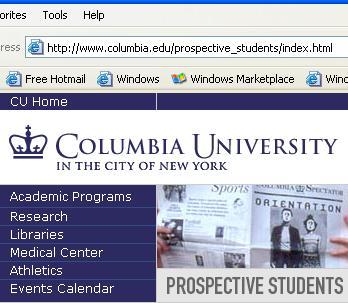Bill Menke's BLOG Page: The Timely Death of Early Admissions
|

Click here to apply ...
|
I am embarassed to say that I cannot bring myself to encourage even
the brightest high school students that I meet to apply to Columbia.
Yet I teach in a Columbia department, Earth and Environmental Sciences,
that has a great international reputation, an excellent undergraduate
program, and an explicit desire to expand its enrollment. But what's
the point? Columbia has an acceptance rate of only about 8%. I just
don't want to dissappoint 11 out of the 12 high school students that I
succeed in convincing to apply!
Of course, you might think that the brightest students - the ones
that I might want to encourage - would have a better chance. We
faculty are kept almost completely out of the admissions process, so I
can't speak on this subject with much authority. But I have the
impression that, actually, a very large fraction of Columbia applicants
are extremely bright. Maybe the brightest have a better chance, but
only marginly so. Then again, my idea of brightness, as a physical
scientist, is probably not shared by very many admission officers, so
maybe not.
|
That brings me to Early Admissions. The rate for Early Admissions -
where students get an early decision at the cost of locking themselves
into attending the institution - is quite a bit better, around 25%.
That's still only odds of 1 in 4, but it's sure better than 1 in 12.
Maybe I should be encouraging high school students to apply that way?
The problem is that I believe that students deserve to be offered
choice. I want them to be able to weigh their options on a choice
that will likely have a profound impact on their future. And when
you're seventeen, a few months more of weighing can make a big difference.
Furthermore, most of the high school students that I know don't have a strong
preference for a specific college, but many do have a real fear
that they will not get into anything decent. I don't want to prey
upon that fear!
Then too, Columbia is not all that obvious a first choice
for a science student, who probably would be more inclined to apply
early admission to Caltech or MIT. Convincing a science student
that we should be the school in which they invest their single early
admission opportunity is a hard sell. It's only upon more thorough
examination that our real strengths in science come through.
Harvard and Princeton Universities recently (September 2006) have
announced that they are ending their Early Admissions programs. I think
that they have made the right choice, and hope other schools follow
their lead. It will have the effect of increasing the success rate
in regular admissions, and of reducing - though maybe not eliminating -
some of the quirks in the college admissions process that work
against students making well-informed and deliberative choices about
the college that they would like to attend.